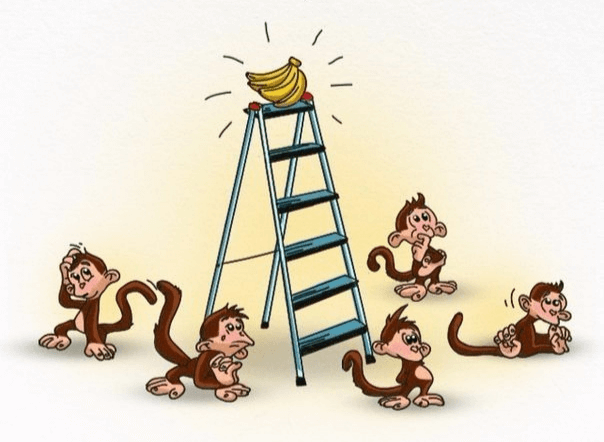

Find your own study to examine this week. Do not use either of the studies in this week’s discussion assignment. For your Learning Journal, you are to fill out the following form. Remember, use complete sentences and proper APA In-Text Citation and References. This will help you with your critical reading skills and your ability to research.
1. What is the title of the text and what is the text about?
The title of the text I examined this week is “The Five Monkeys Experiment & Its Lessons for Your Organization”, and the result of this study gives us an idea of how our society often works. As part of a scientific experiment, five monkeys were placed in a cage, in the middle of which there was a ladder leading to a bunch of bananas at the top. When one of the monkeys started to climb for bananas, the researchers sprayed all the monkeys from the cage with ice water for five minutes. The same thing happened with the second attempt, and the third time the monkeys themselves grabbed the “cellmate” and did not allow her to touch the stairs. After that, the scientists replaced one of the monkeys, while never punishing them with water again, and sometime later all the monkeys in the cage were replaced. Nevertheless, even without knowing the reasons for their actions, they attacked those who wanted to eat bananas and climbed the ladder (ProServeIt, 2018).
2. What is the author’s view? How do I know?
The author of the article believes that this experiment can show us how traditions in society and organizations work. I know this because the author mentions that “the five monkeys experiment says a lot about the pervasiveness of traditions within an organization” (ProServeIt, 2018, para 6). Another important thing about the views of the author is that he or she thinks that we can learn a lot from this study: “[it] teaches us that we need to be constantly challenging ourselves to look at things from a new light” (ProServeIt, 2018, para 8).
3. What is the evidence presented by the author to support ideas?
The author describes in detail the situations of human society, where there are already many traditions and even prejudices, and explains to the reader what happens to society when a new person appears there. At the same time, the author explains why it is important to be open and be able to look at the already-established traditions with a fresh look. To do this, the author offers the reader a number of questions that can help avoid the “syndrome” of the five monkeys.
4. Is the evidence valid? How do I know?
Yes, I think that the evidence is valid. First of all, my own life experience coincides with what the author claims. Also, this indirect analogy that we can draw between the behavior of monkeys from the experiment and the human community, can really teach us a lot and help us avoid such situations.
5. Is the evidence relevant? How do I know?
Yes, it is relevant because it can be applicable to the issues from the study. The evidence provided by the author influences practice and makes the situation from the text more believable.
6. Have I heard/read anything similar or dissimilar? What was it?
There were several interesting experiments I’ve read about before. They all cover the topic of animals and their behavior, skills that can be learned by small groups of animals, and whether they can be transferred to the whole kind or not. Some of these experiments are:
1) Stephenson and his monkey experiment in 1967 (https://www.psychologytoday.com/gb/blog/games-primates-play/201203/what-monkeys-can-teach-us-about-human-behavior-facts-fiction)
2) Traditions within and between Chimpanzee Groups (https://www.cell.com/current-biology/fulltext/S0960-9822(07)01410-8?_returnURL=https%3A%2F%2Flinkinghub.elsevier.com%2Fretrieve%2Fpii%2FS0960982207014108%3Fshowall%3Dtrue)
7. Do I agree or disagree with the views expressed by the author? Why?
I agree with the view expressed by the author. First of all, there are traditions that sometimes are not even understood by members of society, but somehow are followed and put into practice (sometimes not many people even understand why). Second, I agree that we should learn how to be more open-minded and give it a try to look at things from a fresh perspective. All this is very important in order to create a progressive society, not to get stuck in the past and move forward. Changes are inevitable and sticking to habits that are already completely incomprehensible to many will only slow down progress.
References
ProServeIT. (August 14, 2018). The Five Monkeys Experiment & Its Lessons for Your Organization. Retrieved from https://www.proserveit.com/blog/five-monkeys-experiment-lessons
